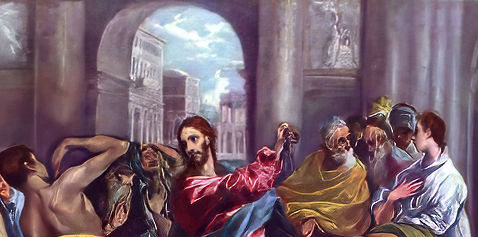
The Salt Blog Takeaways
1. Gospel – Temple will give way to a new means of encountering God
From the Gospel -“In the temple he found people selling cattle, sheep, and doves, and the money changers seated at their tables. Making a whip of cords, he drove all of them out of the temple, both the sheep and the cattle. He also poured out the coins of the money changers and overturned their tables.
From SALT commentary on Lent 3
From SALT commentary on Lent 3
” Today’s passage comes immediately on the heels of that wedding story, as if John is saying: Look, something new and wondrous has come into the world, a new day is dawning — and now, to get a sense of what’s really at stake, listen to this story of Jesus and the Temple in Jerusalem.”
“John’s version puts the story in a somewhat different light, not only because it happens at the outset of Jesus’ public ministry rather than at its end, but also because Jesus calls the place not a “den of robbers” but simply “a marketplace.” What’s going on here? Is Jesus against marketplaces? Well, no — Jesus doesn’t go around Galilee and Jerusalem denouncing local markets, and after all, the temple had to include a marketplace (with vendors selling animals, currency exchanges, etc.) in order to make the longstanding sacrificial system run smoothly. And that’s precisely the point: Jesus’ anger seems to be focused not on marketplaces, or on corruption in general, but rather on the sacrificial system itself. His actions seem to say: It’s high time for that system to end, and for a new era to begin.”
“Zechariah also speaks of a new age to come when the holiness associated with the temple will pervade the whole world, and “there shall no longer be traders in the house of the LORD” (Zech 14:21). The idea seems to be that the traders are part of a layer of separation between God and Israel that one day will be overcome.
…”Thus Jesus driving the traders out of the temple, like his eventual arrival in Jerusalem on a donkey, is a kind of street theater declaring through action that the long-awaited new epoch has begun. Holiness will overflow conventional bounds, and the-temple-as-we-know-it will give way to a more widespread, accessible, direct mode of encountering God.”
2. Jesus casts a revolutionary vision for worship in the new era. His body is the temple.
From the Gospel – “His disciples remembered that it was written, “Zeal for your house will consume me.” The Jews then said to him, “What sign can you show us for doing this?” Jesus answered them, “Destroy this temple, and in three days I will raise it up.” The Jews then said, “This temple has been under construction for forty-six years, and will you raise it up in three days?” But he was speaking of the temple of his body. After he was raised from the dead, his disciples remembered that he had said this; and they believed the scripture and the word that Jesus had spoken.”
From SALT commentary on Lent 3
“Perhaps recognizing the audacious claim embedded in Jesus’ actions, the religious authorities demand a sign that would justify his authority. In veiled and resonant language, Jesus proposes a sign the authorities mistakenly take at face value: “Destroy this temple, and in three days I will raise it up.” They think he’s referring to brick and mortar, but in fact, John explains, “he was speaking of the temple of his body.” Thus Jesus does at least three things at once: (1) he counters the religious authorities; (2) he cryptically predicts his death and resurrection, something his disciples realize only later, “after he was raised from the dead”; and (3) he casts a revolutionary vision for worship in the new era. His body is the temple. Those who “abide in him” (one of John’s favorite themes; see 15:4) thereby abide in “the house of the LORD.” This theme will surface again in Jesus’ conversation with the Samaritan woman about worshiping God not in any specific location but rather “in spirit and truth” (John 4:21-23).
3 Covenant relationship extended – Exodus 20:1-17
From the Old Testament -“Then God spoke all these words:”
From SALT commentary on Lent 3
“Speaking of new eras, this week’s passage from Exodus is the story of another step in the covenantal journey we’ve been tracing over the last few weeks, beginning with the universal covenant in the time of Noah, then the particular covenant in the time of Abraham and Sarah — and now the covenantal law in the time of Moses, iconically represented by the Ten Commandments (literally “ten words”; see Ex 34:28). Conceiving this law as covenantal — that is, as a framework for Israel’s relationship with God — can transform how we hear it: these commandments aren’t arbitrary prohibitions, but rather loving limits that guide human beings toward living with justice, grace, and dignity. Even more, they mark out a way of relating and listening to God in everyday life. This is yet another development or unfolding of what “covenant” means for Israel: with the gift of the law at Sinai, Israel’s relationship with God becomes a tangible, day-to-day, ongoing form of listening (the root of the word “obedience” is the Latin audire, “to listen”). The covenantal law transforms “doing what is right” into “responding to God’s call” — which is to say, into a calling, a vocation, something done not only for its own sake but also as an act of listening, devotion, and companionship with God.”
